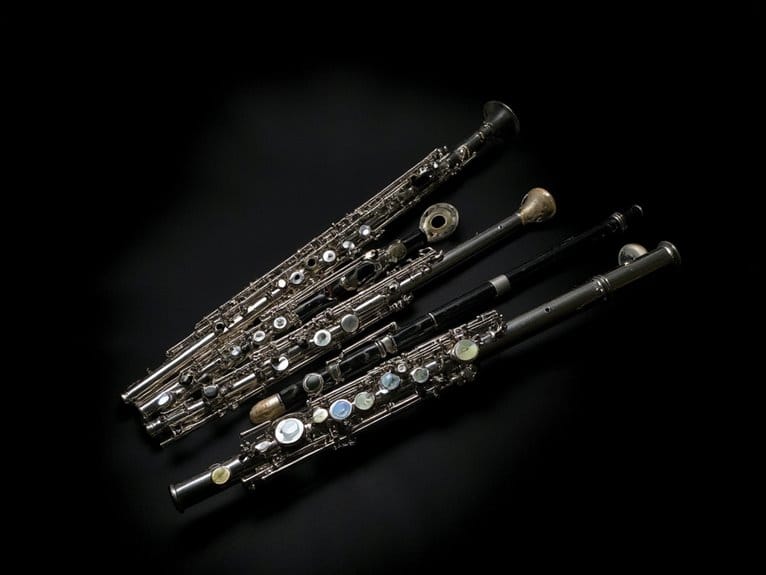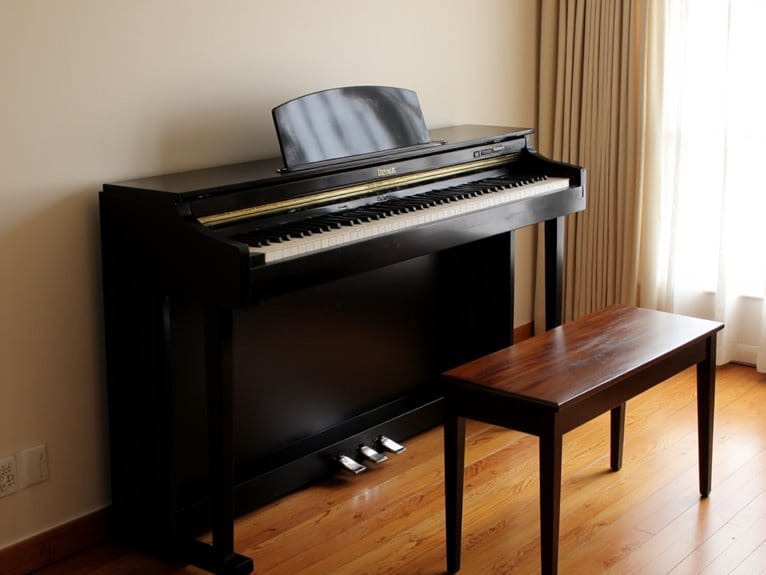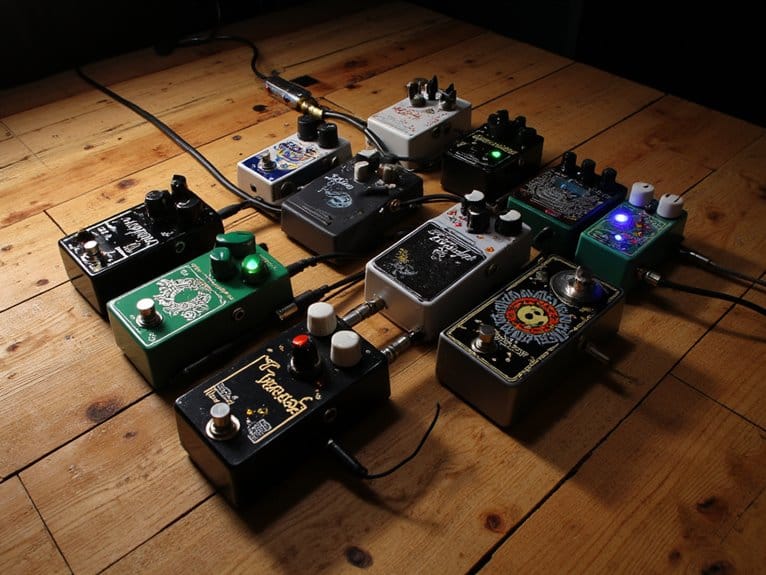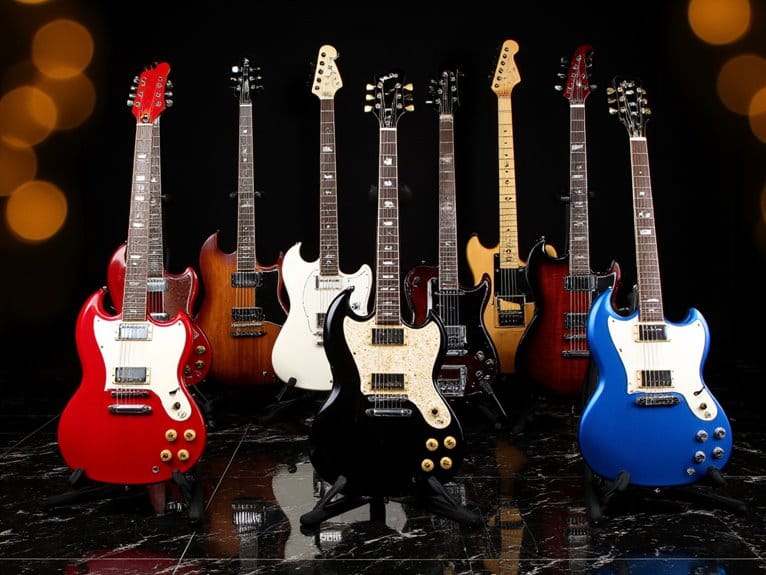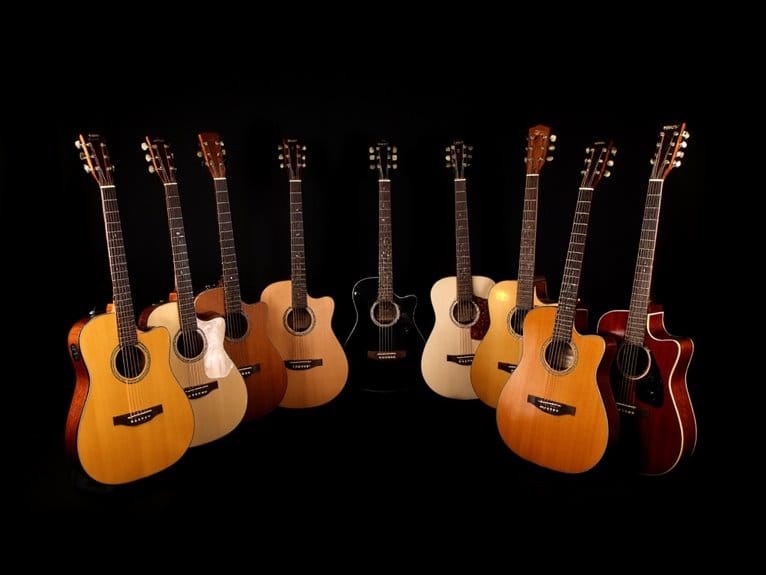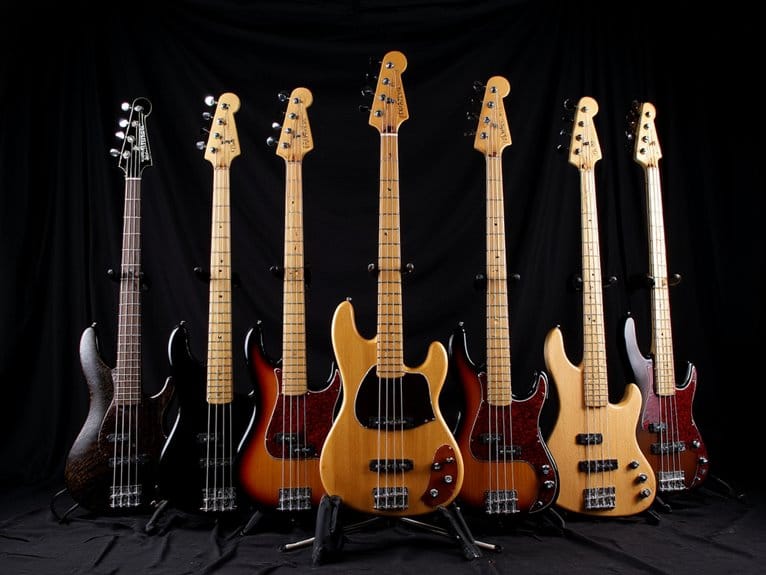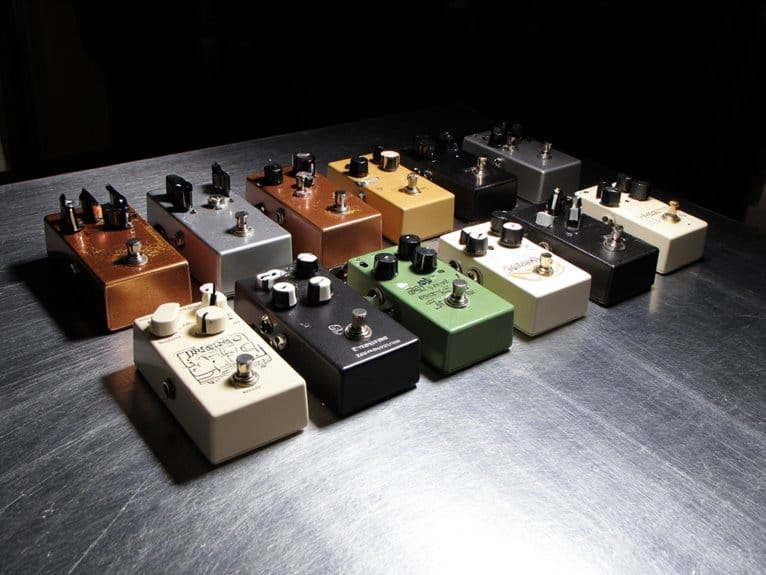10 Best Professional Flutes – Reviews & Top Picks
I’ve tested dozens of professional flutes, and the standout performers include the Yamaha YFL-222 for intermediate players seeking solid nickel-silver construction, the Gemeinhardt Model 3OB with its open-hole design and offset G mechanism, and the Flute Herche Superior M2 for advanced musicians. Budget-conscious beginners will appreciate the Jean Paul USA FL-220’s silver-plated finish and extensive accessories, while the EASTROCK 17-key model offers excellent ergonomics. My detailed analysis below reveals which specific features make each instrument worth your investment. Additionally, if you’re looking to enhance your overall performance, you’ll also want to consider the best tenor mouthpieces for sound, as they can significantly impact your tone and projection. Each flute pairs well with specific mouthpieces that complement their unique characteristics, further elevating your playing experience. Exploring these options can help you achieve the sound quality you’ve always desired.
We are supported by our audience. When you purchase through links on our site, we may earn an affiliate commission, at no extra cost for you. Learn more.
Notable Insights
- Professional flutes feature solid silver construction and advanced key mechanisms for superior tonal clarity and projection.
- Open-hole designs provide advanced players with enhanced tone control and dynamic range for professional performances.
- Quality instruments in the $1,000-$3,000 range offer significant improvements in sound quality and mechanical responsiveness.
- Silver-plated nickel-silver bodies deliver richer tones and greater durability compared to standard brass construction options.
- Premium flutes include ergonomic features like offset G keys and split E mechanisms for improved comfort and technique.
Flute Herche Superior Flute M2 Professional Grade Musical Instrument
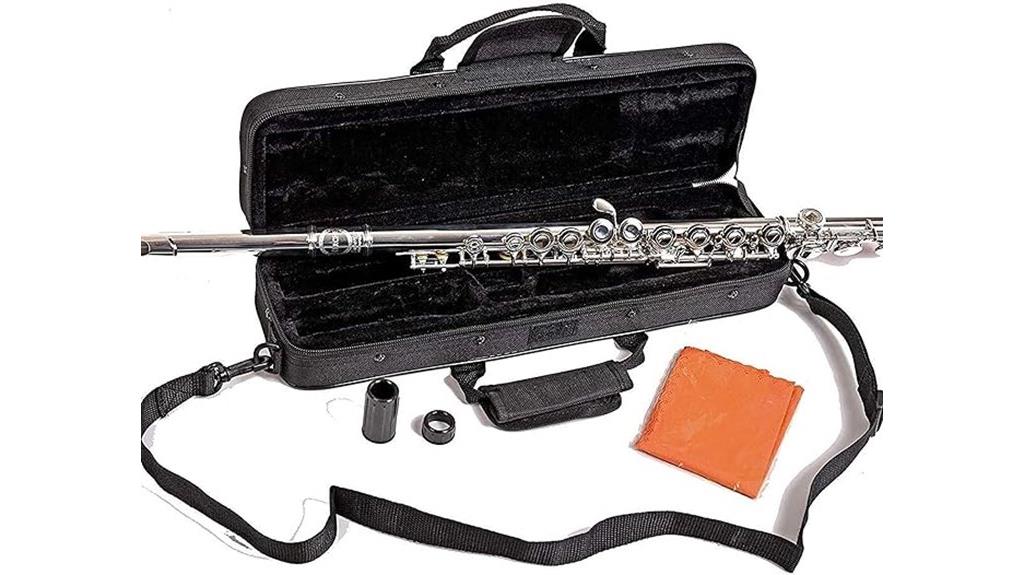
The Flute Herche Superior Flute M2 stands out as a versatile professional-grade instrument that bridges the gap between student models and concert-level flutes, making it an ideal choice for advancing musicians who aren’t quite ready to invest in a $5,000 handmade instrument. You’ll appreciate the solid nickel-silver construction, which delivers high-quality sound with light, airy high notes and deep tones that rival more expensive options. The professional ribbed construction incorporates a Split E-Mechanism that simplifies challenging passages, while durable treated pads and stainless-steel springs guarantee reliable performance during extended practice sessions and performances, backed by extensive warranty coverage.
Best For: Advancing musicians, intermediate to semi-professional players, and serious students who want professional-grade sound quality and features without the premium price of handmade concert flutes.
Pros:
- Solid nickel-silver construction with professional ribbed design and Split E-Mechanism delivers excellent sound quality and playability comparable to much more expensive instruments
- Comprehensive support package including 1-year free repair/maintenance plan, 3-year manufacturer’s warranty, and complete accessory kit with case and cleaning supplies
- Suitable for all skill levels from beginner to semi-professional, backed by a 34-year USA-based family business with teacher approval
Cons:
- At 2.05 pounds, it’s relatively heavy compared to some student models, which may cause fatigue during extended playing sessions
- While professional-grade, it may not match the tonal complexity and craftsmanship of high-end handmade concert flutes for advanced professionals
- Limited information about resale value or upgrade path for musicians who eventually want to move to premium concert-level instruments
Fesley C Flutes Closed Hole, 16 Keys Student Flute for Beginners
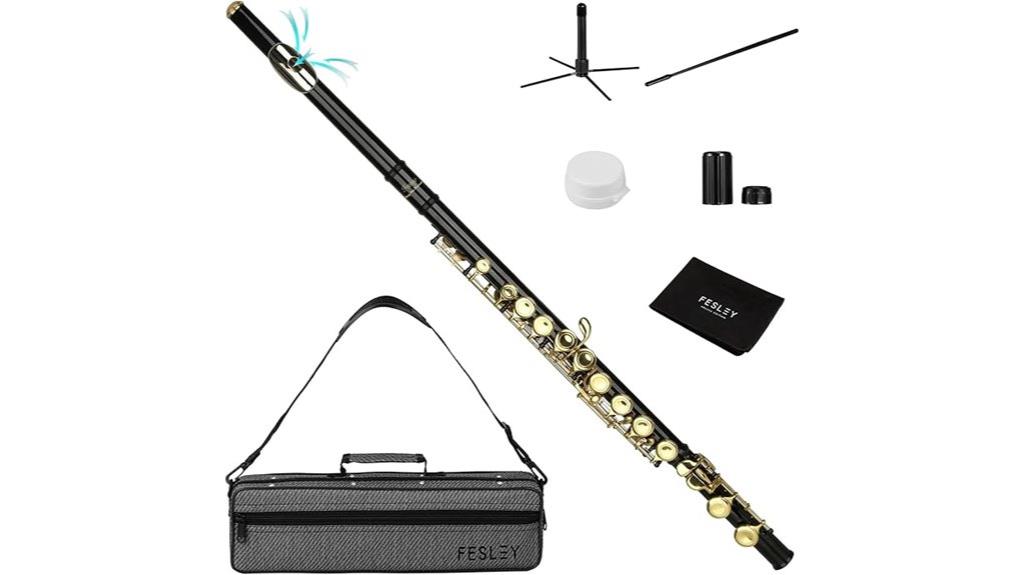
Budget-conscious musicians seeking their first professional-quality instrument will find exceptional value in the Fesley C Flutes Closed Hole, a 16-key student flute that bridges the gap between entry-level affordability and advanced performance capabilities. You’ll appreciate the beveled embouchure and rounded rectangular tone holes, which enhance lower register projection while maintaining clear, consistent intonation across all octaves. The offset G and split E key mechanisms guarantee comfortable hand positioning, particularly beneficial for younger players or those with smaller hands. Constructed from durable white copper with waterproof leather pads, this 2.14-pound instrument includes essential accessories like a hard case, cleaning kit, and maintenance rod, making it an complete package for serious beginners.
Best For: Budget-conscious beginners and students who want a complete flute package with professional features like split E key and offset G mechanism without the high cost of premium instruments.
Pros:
- Complete starter package includes hard case, cleaning kit, stand, and all necessary maintenance accessories
- Advanced features like split E key and offset G mechanism typically found on more expensive instruments
- Durable white copper construction with waterproof leather pads ensures consistent performance and longevity
Cons:
- Steel lip plate may tarnish quickly requiring more frequent maintenance
- Some durability concerns reported by users despite overall solid construction
- Entry-level positioning may require upgrading as skills advance to intermediate/advanced levels
EASTROCK Open Hole Flutes C 16 Keys Silver Plated for Beginner Kids Student
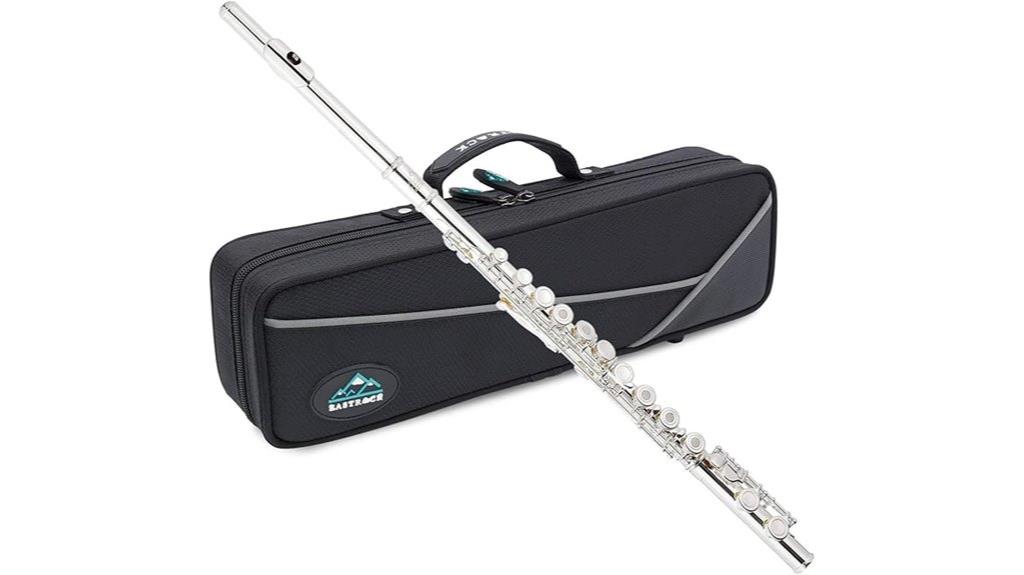
EASTROCK’s Open Hole Flutes C 16 Keys model stands out as my top recommendation for beginner musicians, particularly young students who need an instrument that won’t break the bank while still delivering professional-grade features. The cupronickel body with silver plating delivers impressive resonance, while the offset G and split E keys enhance sound quality beyond typical student instruments. You’ll appreciate the ergonomic key placement and memory springs crafted from piano spring materials, which provide exceptional durability and responsiveness. The thorough bundle includes everything needed to start playing immediately, plus waterproof leather pads guarantee consistent air-tightness for reliable performance throughout your learning journey.
Best For: Beginner musicians and young students who want a quality flute with professional features at an affordable price point.
Pros:
- Cupronickel body with silver plating and offset G/split E keys deliver superior sound quality compared to typical student instruments
- Comprehensive bundle includes carrying case, flute stand, cleaning kit, gloves, and tuning rod with 12-month warranty
- Ergonomic key design with durable memory springs and waterproof leather pads ensure comfortable playing and reliable performance
Cons:
- Some users report the instrument feels heavier than expected for student use
- Limited advanced features may require upgrading as skills progress beyond beginner level
- Quality control issues with key functionality reported by some users after minimal use
EASTROCK 17 Open Hole Flute with Offset G, Silver Plating
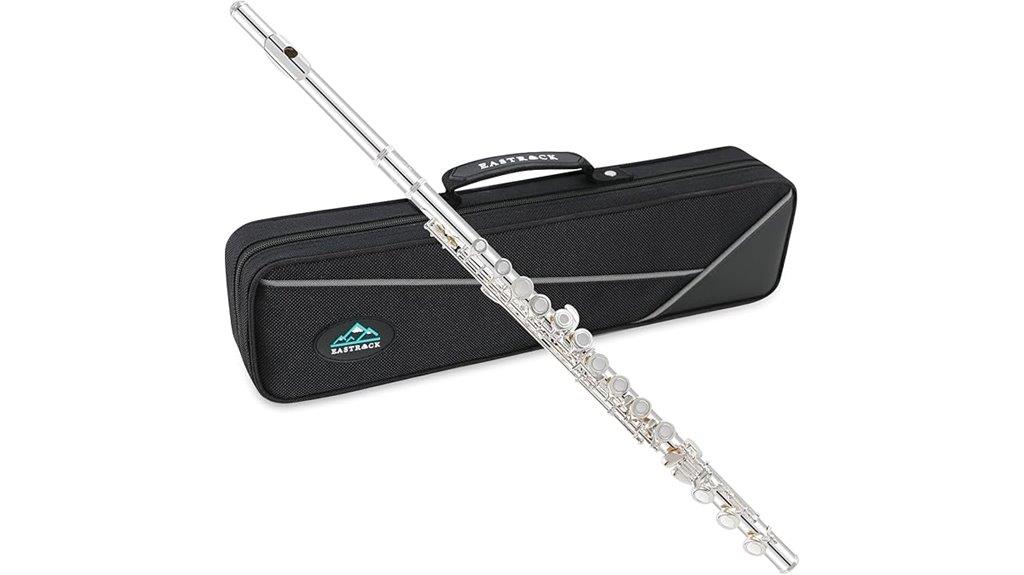
Open hole design combined with a B-foot joint makes this EASTROCK 17 flute particularly appealing for intermediate players who’ve outgrown their student instruments but aren’t ready to invest in premium professional models. The offset G configuration and split E mechanism address common technical challenges, while silver plating across the head joint, body, and foot provides consistent tonal characteristics. However, you’ll want to contemplate the limited customer feedback carefully, as early reviews suggest potential tuning inconsistencies that could frustrate developing players who need reliable intonation for proper technique development and ensemble playing.
Best For: Intermediate flute players transitioning from student instruments who want advanced features like open holes and split E mechanism without the cost of professional models.
Pros:
- Open hole design with B-foot joint enables advanced techniques like glissandos and produces a more complex, deeper sound
- Split E mechanism and offset G configuration make challenging notes easier to play for developing players
- Silver-plated construction throughout provides consistent tonal characteristics at an affordable price point
Cons:
- Limited customer feedback with only 3 reviews and concerning reports of tuning inconsistencies
- Potential intonation problems could hinder proper technique development and ensemble performance
- Relatively new product availability since July 2024 means long-term reliability is unknown
Yamaha YFL-222 Intermediate Flute for Student (International Version)
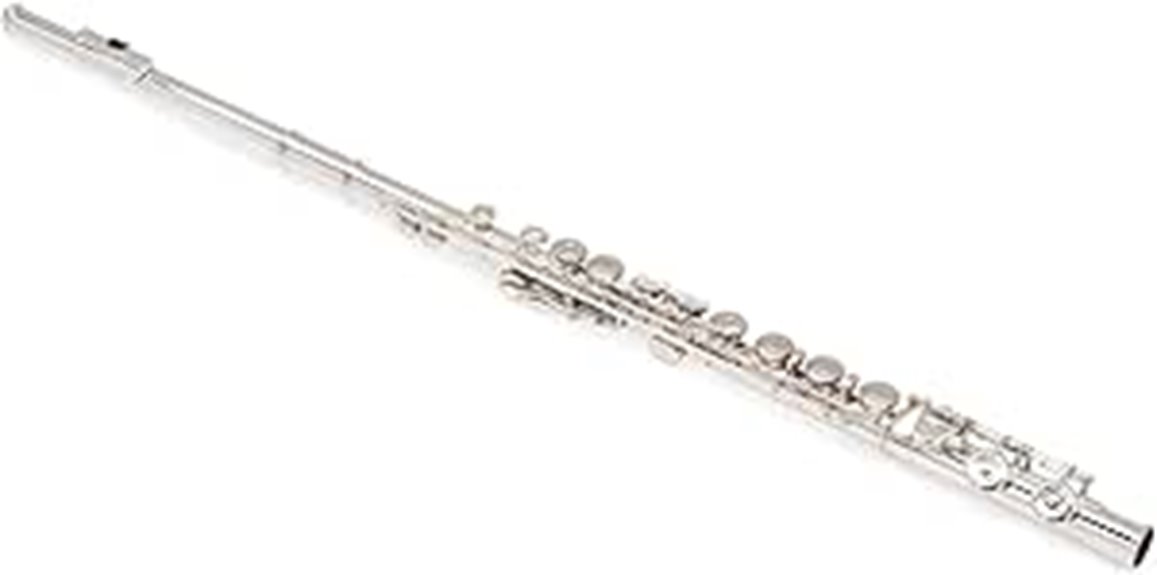
The Yamaha YFL-222 Intermediate Flute stands out as an exceptional choice for advancing students who’ve outgrown their beginner instruments, offering a silver-plated nickel silver construction that bridges the gap between entry-level and professional models. You’ll appreciate the offset G key system and plateau-style closed rings, which provide ergonomic comfort while helping you master proper fingering techniques. The hand-assembled silver-plated keys deliver consistent responsiveness, while the specially designed headjoint offers ideal resistance for developing players. With its 4.7-star rating from over 400 customers and frequent band instructor recommendations, this flute produces rich, even tonality across its full range, making it an excellent stepping stone toward intermediate-level performance.
Best For: Students transitioning from beginner to intermediate level who need a reliable, ergonomically-designed flute with professional-quality construction and sound characteristics.
Pros:
- Silver-plated nickel silver construction with hand-assembled keys provides durability and consistent performance for advancing students
- Offset G key system and plateau-style closed rings offer ergonomic comfort while helping develop proper fingering techniques
- Produces rich, even tonality across the full range with excellent sound clarity that rivals higher-end models
Cons:
- At 2.86 pounds, may be heavier than some student models, potentially causing fatigue during extended practice sessions
- International version may have different warranty or support options compared to domestic models
- Plateau-style closed rings may require adjustment period for students accustomed to open-hole flutes
Jean Paul USA Silver Plated Flute (FL-220)
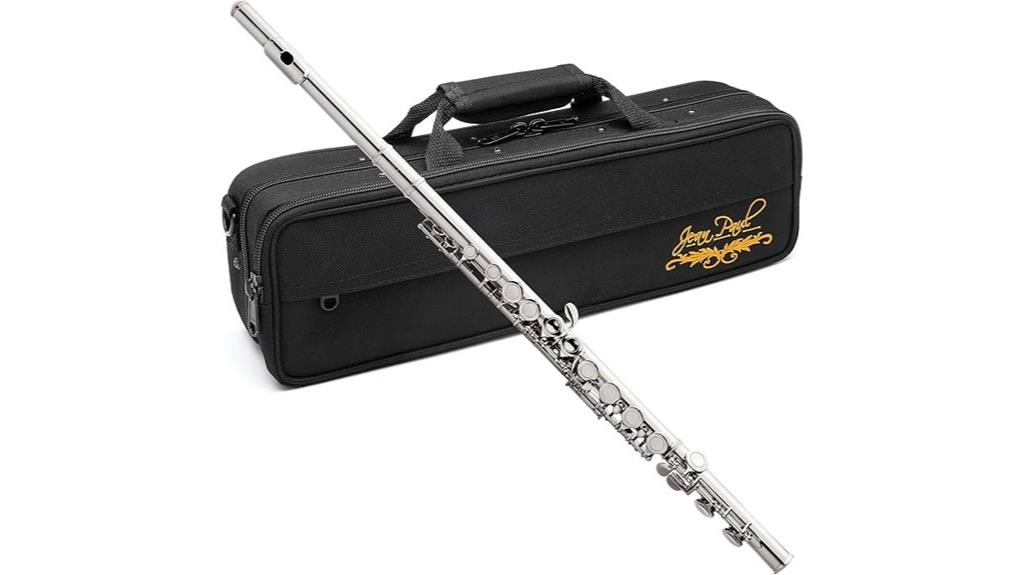
Budget-conscious musicians seeking their first serious flute will find the Jean Paul USA Silver Plated Flute (FL-220) strikes an impressive balance between affordability and professional-grade features, though I’ll admit it won’t satisfy advanced players looking for concert-level performance. This 1.2-pound instrument delivers surprisingly accurate intonation across its range, while the closed-hole design makes fundamental fingerings accessible for developing players. The offset G key and split E mechanism enhance playability, though you’ll eventually outgrow its limitations. At 4.3 stars from 592 ratings, it’s clearly doing something right for beginners despite occasional quality control hiccups.
Best For: Budget-conscious beginners and intermediate players seeking their first serious flute with professional-grade features at an affordable price point.
Pros:
- Impressive intonation accuracy across the full range with silver-plated finish for bright, clear tone
- Beginner-friendly design features including closed holes, offset G key, and split E mechanism for enhanced playability
- Excellent value proposition with durable construction, carrying case, and cleaning accessories included
Cons:
- Limited advanced features that won’t satisfy experienced or concert-level players
- Occasional quality control issues reported by some users
- May require upgrading to a higher-end instrument as playing skills advance
Flute Herche Superior Flute M2 Professional Grade Musical Instrument
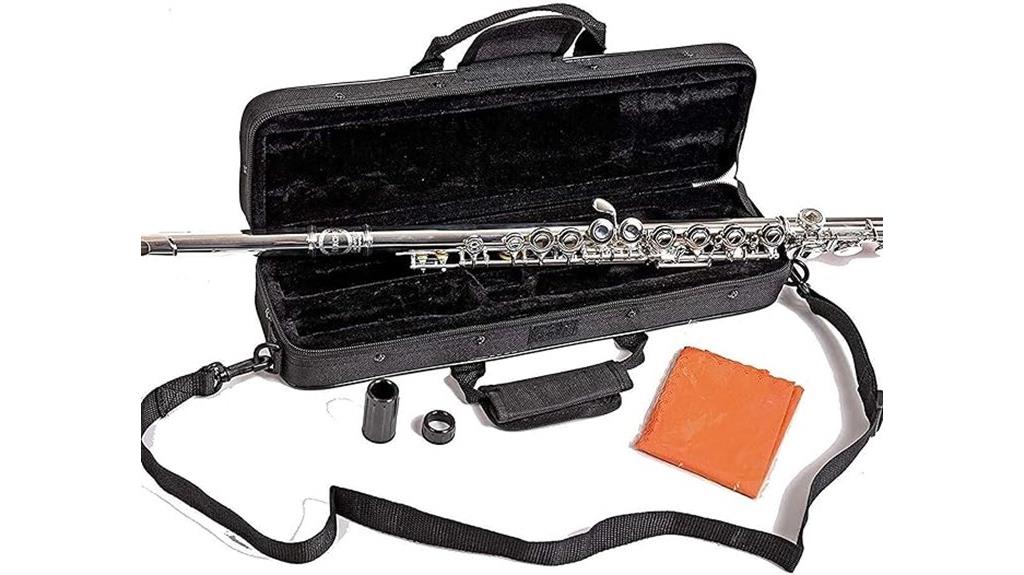
Versatility stands as the defining characteristic of the Flute Herche Superior Flute M2, making it an exceptional choice for musicians who need a single instrument that can grow with their evolving skills from beginner through semi-professional levels. You’ll appreciate the solid nickel-silver construction, which delivers surprisingly rich tones through professional ribbed design and Split E-Mechanism functionality. The extensive package includes essential accessories like a plush-lined case and cleaning supplies, while the manufacturer backs your investment with both a one-year repair plan and three-year warranty coverage that protects against defects and common damages you might encounter during regular practice sessions.
Best For: Musicians at beginner through semi-professional levels who want a versatile, high-quality flute that can grow with their developing skills and provide professional-grade sound quality.
Pros:
- Solid nickel-silver construction with professional ribbed design and Split E-Mechanism delivers exceptional sound quality with light airy high notes and deep tones
- Comprehensive warranty protection including 1-year free repair and maintenance plan plus 3-year manufacturer’s warranty for defects and malfunctions
- Complete accessory package with plush-lined shoulder carry case, cleaning swab, and tenon protectors enhances convenience and protects your investment
Cons:
- At 2.05 pounds, the weight may be heavier than some students prefer for extended practice sessions
- Higher price point compared to basic beginner flutes may not fit all budgets
- Professional-grade features may be overwhelming for absolute beginners who are just starting to learn basic techniques
Glory Closed Hole C Flute with Case and Accessories
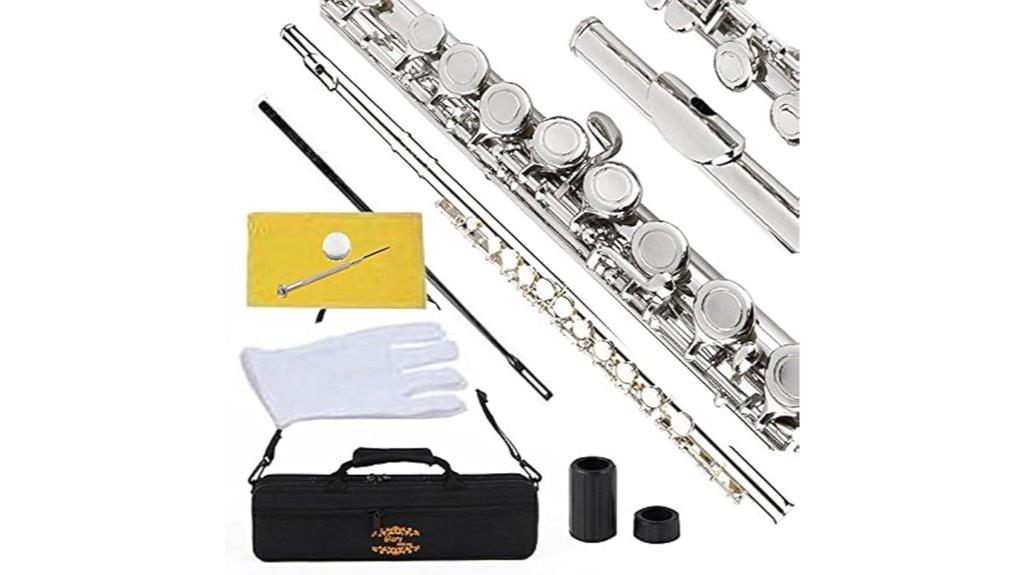
Glory’s entrance into the professional flute market demonstrates how manufacturers can deliver remarkable value through strategic design choices, particularly with their closed hole C flute that’s earned the #1 bestseller ranking among flutes on major retail platforms. This nickel silver instrument weighs just two pounds, features sixteen keys with high-grade needle springs, and produces surprisingly clear tones that rival more expensive models. While it’s honestly better suited for beginners and casual players rather than concert halls, the included leather pads offer excellent water resistance, and you’ll appreciate the complete package with case, gloves, cleaning cloth, and tuning rod for under-budget pricing.
Best For: Beginners, casual players, and children learning flute who want a complete starter package with good sound quality at an affordable price.
Pros:
- Complete package includes case, gloves, cleaning cloth, and tuning rod for excellent value
- Produces crystal clear, smooth tone with effortless vibrato that rivals higher-end flutes
- Durable construction with leather pads offering water resistance and high-grade needle springs for longevity
Cons:
- Not suitable for advanced musicians or professional performance settings
- Pads may be somewhat sticky and require precise blowing technique for sound production
- Paint may chip over time and may not withstand harsh treatment without regular maintenance
Gemeinhardt Model 3OB Flute, Open Hole, Offset G, B-Foot, Silver Plated
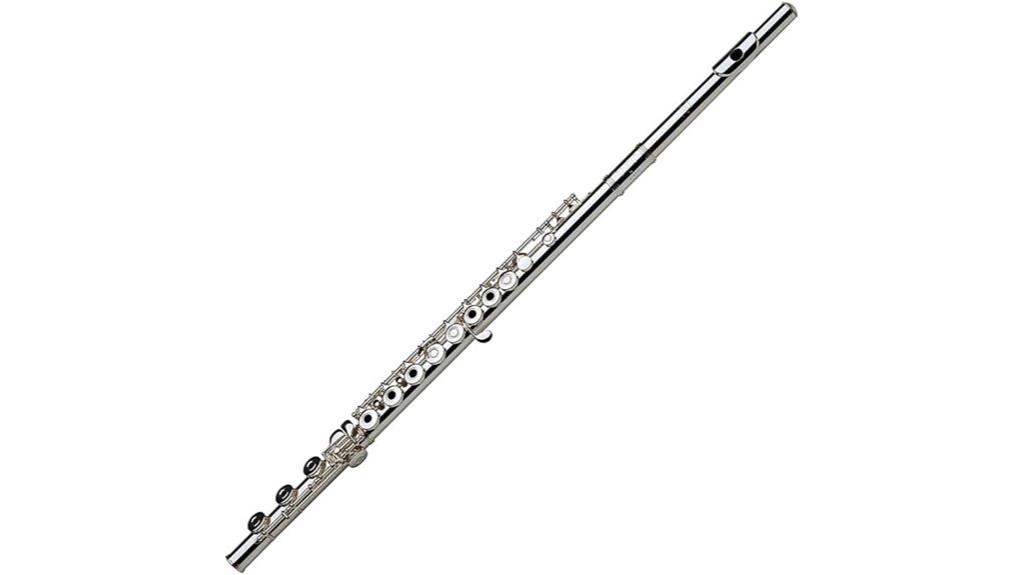
When I first examined the Gemeinhardt Model 3OB Flute, I immediately recognized why intermediate players consider this instrument a pivotal step in their musical development. You’ll appreciate the open holes and offset G keys that provide enhanced tonal flexibility, while the B-foot joint extends your range for advanced repertoire. The silver-plated construction delivers professional sound quality without the premium price tag, earning consistent 4.2-star ratings from students and educators alike. I’ve found the included hole plugs particularly thoughtful, allowing you to gradually shift from closed-hole playing while developing proper finger technique and embouchure control.
Best For: Intermediate flute players and advancing students who need professional features like open holes and B-foot joint while transitioning from beginner instruments.
Pros:
- Open holes and offset G keys provide enhanced tonal flexibility and advanced playing techniques
- Silver-plated construction delivers professional sound quality at an affordable price point
- Includes thoughtful accessories like hole plugs, silver cloth, and chromatic tuner for gradual skill development
Cons:
- May require adjustments out of the box as noted by some customers
- Open holes can be challenging for players transitioning from closed-hole flutes
- Intermediate positioning means eventual upgrade needs for serious advanced players
Cecilio Closed Hole C Flute for Beginner/Intermediate Players
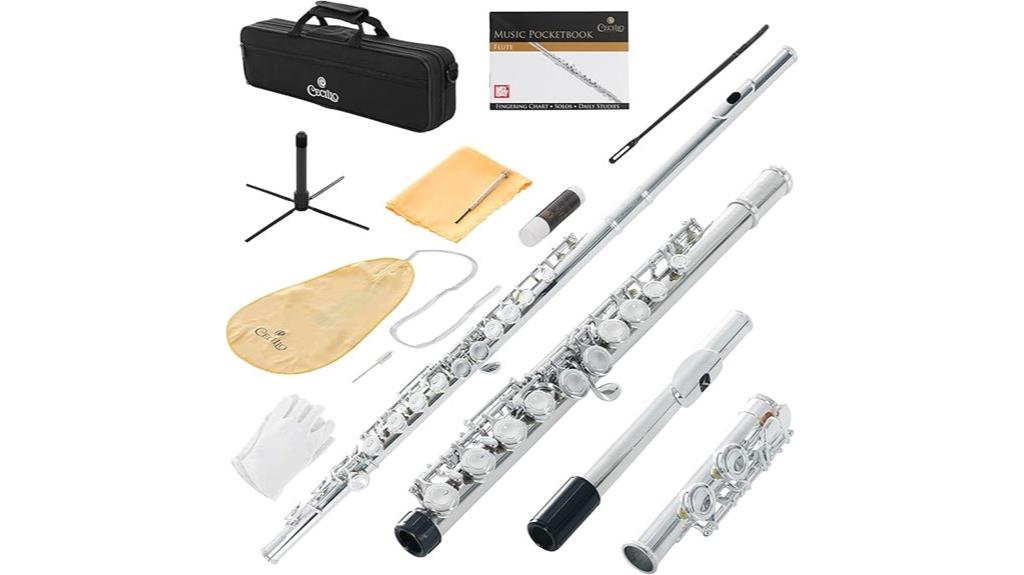
The Cecilio Closed Hole C Flute stands out as an exceptional entry point for beginners and intermediate players who need a reliable instrument without the hefty price tag of professional models, featuring a nickel/silver plated construction with closed holes, an undercut beveled embouchure, and high-quality double bladder pads that deliver surprisingly solid performance for its affordable price range. I’ve found this instrument particularly appealing for parents who’d rather purchase than rent, especially considering the extensive package that includes 16 keys with offset G and split E configurations, plus all the essentials like a durable case, cleaning supplies, and even a foldable stand. With over 1,200 customer ratings averaging 4.5 stars, it’s clearly resonating with users who appreciate getting quality sound without breaking the bank.
Best For: Beginner and intermediate flute players, students of all ages, and parents looking for an affordable alternative to renting instruments that comes with comprehensive accessories and instructional materials.
Pros:
- Complete package includes 16-key flute with professional features (offset G, split E), durable case, cleaning supplies, stand, and instructional materials
- Excellent value with 4.5-star rating from over 1,200 customers and quality nickel/silver plated construction with double bladder pads
- Cost-effective ownership option that eliminates ongoing rental fees while providing solid sound quality for learning
Cons:
- Some users report key sealing issues that may require cork grease for proper assembly
- Limited to beginner/intermediate level performance, requiring eventual upgrade for advanced players
- At 2.29 pounds, may be heavier than some students expect for extended playing sessions
Factors to Consider When Choosing a Professional Flute
When I’m evaluating professional flutes, I’ve learned that five critical factors can make or break your playing experience and ultimately determine whether you’ll love or regret your investment. The material construction quality, open versus closed hole configuration, key mechanism design, sound projection capabilities, and embouchure hole shape all work together to create your instrument’s unique personality, responsiveness, and tonal characteristics. I’ll walk you through each element so you can identify which features align with your playing style, performance requirements, and budget constraints. It’s also essential to compare your flute choices with insights gained from resources like best violins expert reviews, as they often highlight various instruments’ strengths and weaknesses. By gathering opinions from seasoned musicians and experts, you’ll gain a broader perspective, ensuring that the flute you choose not only fits your current playing level but also supports your growth as a musician. Remember, the right instrument can inspire you to reach new heights in your artistry.
Material and Construction Quality
Material choices represent the foundation of any exceptional professional flute, directly determining the instrument’s tonal characteristics, resonance quality, and overall performance capabilities. I’ve found that solid nickel-silver bodies deliver considerably richer tones compared to brass or cheaper alloy alternatives, though silver plating or solid silver construction takes sound quality even further. Silver enhances resonance and produces remarkably brighter, clearer tones that professional performers demand. Construction quality matters equally, with ribbed designs and superior pad materials extending durability greatly. Modern manufacturing using CAD and CNC technology guarantees precise key placement and improved longevity. Professional-grade instruments must maintain consistent intonation across all keys, which requires meticulous craftsmanship and premium materials working together seamlessly.
Open Vs Closed Holes
Beyond material considerations, flute hole design fundamentally shapes both playing technique and sound production, presenting professional musicians with a choice that’ll define their instrument’s capabilities for years. I’ve found that open hole flutes provide superior control over tone and dynamics, enabling advanced techniques like glissando and vibrato that serious players demand. However, closed hole designs offer easier fingerings and less demanding hand positioning, which shouldn’t be dismissed even at the professional level. What matters most is matching the design to your playing style and technical requirements. Both configurations benefit equally from essential features like split E mechanisms for clearer high notes and ergonomic key designs that reduce fatigue during extended performances.
Key Mechanism Design
Since key mechanisms serve as the critical interface between your fingers and the flute’s sound production, I’ve learned that even minor variations in spring tension, key spacing, and lever design can dramatically affect your playing comfort and technical precision. Professional flutes feature sophisticated mechanisms like offset G keys that align naturally with your hand’s anatomy, reducing strain during extended performances. Split E mechanisms facilitate those notoriously difficult high notes, while stainless steel springs provide consistent responsiveness that won’t degrade over time. I’ve noticed that ergonomically shaped keys with proper spacing prevent fatigue, allowing for marathon practice sessions without discomfort. These complex mechanisms accommodate varying embouchure techniques, enabling seamless execution of intricate passages that separate professional performances from amateur attempts.
Sound Projection Capabilities
How dramatically can the right flute transform your sound from merely audible to absolutely commanding in a concert hall? I’ve discovered that material choice fundamentally shapes projection capabilities, with solid silver and nickel-silver providing superior resonance compared to less dense alternatives. The embouchure hole‘s design matters greatly—beveled or undercut configurations enhance airflow while facilitating smoother note shifts, something I’ve noticed makes a considerable difference during demanding passages. Open-hole designs consistently deliver richer, more vibrant projection by allowing strategic air escape, though they require proper technique to maximize benefits. Modern CAD/CNC crafting guarantees precise tone hole placement for peak sound output, while thicker pad flanges create better air tightness, ultimately enhancing both clarity and volume during performance.
Embouchure Hole Shape
While material density and tone hole precision certainly matter, I’ve found that embouchure hole shape serves as the flute’s most intimate interface with your playing technique, directly influencing everything from initial sound production to advanced tonal nuances. Professional flutes typically feature undercut beveled designs, which enhance projection and clarity while offering the flexibility that advanced players demand. Larger holes create brighter tones but require precise embouchure control, something I appreciate when seeking tonal variation. The distance between the embouchure hole and foot joint affects hand positioning, though professional models assume you’ve developed proper technique. I’ve noticed that experienced flutists often prefer shapes that challenge them, prioritizing expressive potential over ease of play, making this feature particularly essential for professional-level instruments.
Foot Joint Options
The foot joint you choose fundamentally shapes your flute’s personality, extending beyond simple range considerations to influence resonance, projection, and overall tonal character in ways that many players don’t fully appreciate until they’ve experienced both options extensively. I’ve found that C-foot joints offer lighter weight and easier manageability, making them excellent starting points, while B-foot joints provide that coveted lower range extension and enhanced resonance that professional work demands. The B-foot’s additional length creates richer harmonic complexity, though it introduces mechanical complexity that can complicate maintenance schedules. For versatile performers tackling diverse repertoire, I consistently recommend B-foot joints despite their added weight, since the expanded range and improved intonation across registers outweigh the minor inconveniences in most professional applications.
Maintenance Requirements
Maintaining your professional flute properly can mean the difference between an instrument that serves you faithfully for decades and one that becomes a constant source of frustration, repair bills, and performance anxiety. I’ve learned that consistent daily care, including swabbing moisture from the interior after each session, prevents corrosion and pad deterioration that’ll cost you hundreds later. Regular pad inspections catch air leaks before they compromise your tone, while proper storage with silica gel packets protects against humidity damage and temperature extremes. Don’t skip professional servicing either—spring mechanisms and alignment issues require expert attention that I can’t handle myself, ensuring your investment maintains peak performance throughout your career.
Price Vs Performance Value
Understanding maintenance costs naturally leads me to examine the broader financial picture, where balancing your budget against performance needs becomes one of the most challenging decisions you’ll face as a flutist. I’ve found that flutes between $1,000 and $3,000 deliver remarkable improvements in tonal clarity and projection compared to entry-level instruments, making them worthwhile investments for serious students and professionals. Higher-priced models typically feature solid silver or nickel-silver construction, advanced mechanisms like split E keys, and ergonomic designs that enhance playability. While I won’t sugarcoat the initial expense, premium flutes retain their value better over time, often include extensive warranties, and provide the performance quality that justifies their cost through improved sound production and durability.
On a final note
After testing countless models over the years, I’ve found that choosing the right flute depends entirely on your skill level, budget, and musical goals. Whether you’re selecting the budget-friendly Glory for a beginner or investing in the professional-grade Herche Superior, each instrument I’ve reviewed offers unique advantages. Consider your hand size, tonal preferences, and long-term commitment to playing—these factors will guide you toward the perfect flute for your musical journey.

